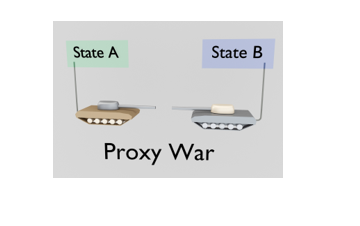
Israel’s Strategic Dilemma
Debate in Israel about the government’s strategy in the Gaza war is heating up. While a majority of Israelis still support the war in Gaza, a growing minority are questioning whether continuing the war against Hamas will bring greater security to Israel or stability to the region, arguing that the government’s military campaign will perpetuate a conflict damaging all parties – not least Israelis themselves. Benjamin Netanyahu’s failure to bring home the Israeli hostages has reinforced tensions and doubt among the public. But continuing the war suits the incumbent government, enabling them to remain in power. Paradoxically, it also suits Hamas. Only when a majority of Israelis themselves conclude that the current strategy puts at risk rather than guarantees their …

Review of the Routledge Handbook of Proxy Wars (with two DPIR contributions)
DPhil candidate Giuseppe Spatafora summarises the key findings of the recently published Routledge Handbook of Proxy Wars, which aims to present the various facets of the phenomenon. The Handbook contains two contributions by DPIR scholars: one by Spatafora himself on the extent to which the Spanish Civil War presents proxy war characteristics, and one by Dr. Vanessa Meier on quantitative approaches to the study of proxy wars. The phenomenon of proxy wars has existed for centuries, well before what is commonly perceived as its heyday—the Cold War. Albeit more modern, the study of proxy wars is not in its infancy either. The Routledge Handbook of Proxy Wars (2023), edited by Assaf Moghadam, Vladimir Rauta, and Michel Wyss, aims to illustrate …

Escape of the Gaak: New technologies and the ethics of war
In 2002, the Magna Science Centre in South Yorkshire witnessed a surprising event: a two foot tall robot, Gaak, escaped from a gladiatorial experiment with learning robots. The experiment, part of the “Living Robots” project, simulated a predator and pray scenario where some robots searched for food (prey) and others hunted for them (predators). Gaak, a predator, was left unattended for fifteen minutes and, in that time, managed to find and navigate along a barrier, find a gap, move through it and continue across a car park to the M1 motorway. Gaak was found rather quickly when a motorist almost collided with it. This story of robot liberation helps us to understand a simple fact about learning machines: they are unpredictable. …









